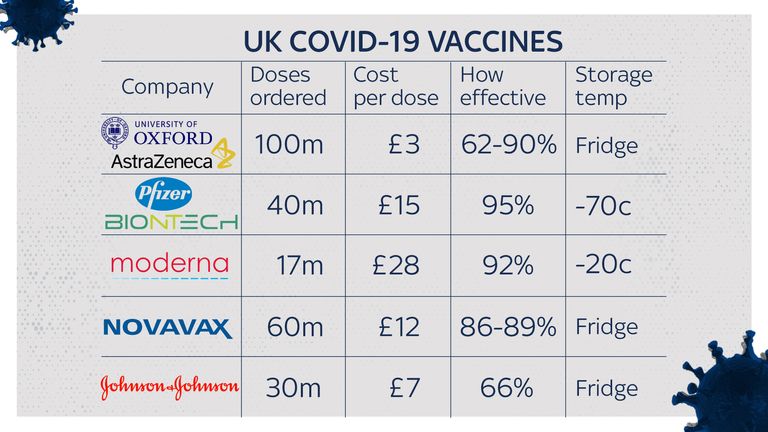Volunteers are to be recruited from today for a world-first study that will mix and match Covid-19 vaccines.
The trial on more than 800 people over the age of 50 will compare the effect of giving a dose of the AstraZeneca/Oxford vaccine followed a few weeks later by the Pfizer/BioNTech jab or vice versa.
The interval between the doses will be either four or 12 weeks to test whether giving the immune response a longer time to mature can improve the result.
Initial results should be available by the summer.

Professor Matthew Snape, a vaccinologist at Oxford University and part of the Oxford vaccine team, said the ability to use different jabs would guard against any supply problems.
He said: "If we do show that these vaccines can be used interchangeably in the same schedule this will greatly increase the flexibility of vaccine delivery, and could provide clues as to how to increase the breadth of protection against new virus strains."
The study, run by the National Immunisation Schedule Evaluation Consortium (NISEC), will be run at eight hospital centres around England. Volunteers will be recruited over the next two to three weeks through the Covid-19 Vaccine Research Registry.
They will have regular blood tests to assess their levels of antibodies and T-cells, which help to clear infections and act as an immune memory.
Further vaccines could also be added to the mix once they are approved by the medical regulator.
Minister for Covid-19 Vaccine Deployment Nadhim Zahawi said: "This is a hugely important clinical trial that will provide us with more vital evidence on the safety of these vaccines when used in different ways."
There are no current plans to alter the current vaccine schedule, which has a gap of up to 12 weeks between two doses of the same jab.
Dr Peter English, a consultant in communicable disease control at Public Health England, said: "Many vaccines work better if a different vaccine is used for boosting - an approach described as heterologous boosting.
"Examples include hepatitis B, where some people respond poorly to vaccination but better if a heterologous booster is given."
Latest Stories
-
DAMC, Free Food Company, to distribute 10,000 packs of food to street kids
16 minutes -
Kwame Boafo Akuffo: Court ruling on re-collation flawed
36 minutes -
Samuel Yaw Adusei: The strategist behind NDC’s electoral security in Ashanti region
38 minutes -
I’m confident posterity will judge my performance well – Akufo-Addo
50 minutes -
Syria’s minorities seek security as country charts new future
2 hours -
Prof. Nana Aba Appiah Amfo re-appointed as Vice-Chancellor of the University of Ghana
2 hours -
German police probe market attack security and warnings
2 hours -
Grief and anger in Magdeburg after Christmas market attack
2 hours -
Baltasar Coin becomes first Ghanaian meme coin to hit DEX Screener at $100K market cap
2 hours -
EC blames re-collation of disputed results on widespread lawlessness by party supporters
3 hours -
Top 20 Ghanaian songs released in 2024
3 hours -
Beating Messi’s Inter Miami to MLS Cup feels amazing – Joseph Paintsil
3 hours -
NDC administration will reverse all ‘last-minute’ gov’t employee promotions – Asiedu Nketiah
3 hours -
Kudus sights ‘authority and kingship’ for elephant stool celebration
4 hours -
We’ll embrace cutting-edge technologies to address emerging healthcare needs – Prof. Antwi-Kusi
4 hours

